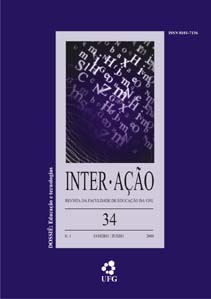REFLECTIONS ABOUT THE DISCOURSE ON EDUCATION
DOI:
https://doi.org/10.5216/ia.v34i1.6566Abstract
The onset of modernity has brought in its wake historical ruptures that have introduced new dimensions and tensions between people and society. Since then, important techno-scientific evolutions have occurred, consolidating new ways of being, thinking and living. In the present context, scientific and technological evolution has reached unprecedented levels. It is the spreading of a new way of producing life on a global scale breaking barriers of time and space and spreading in seismic waves so fast that no single place is left without marks of its presence. However, it is not a linear movement similar in all kinds of context. It imposes social, economic and cultural adaptations on society. Rooted in culture, education also undergoes changes in order to adapt to this new modern technological level. Unesco, the global agency which deals with education, science and culture, directs the lines of action of education throughout the world through its policies. Among these is the Delors Report (2001) which states the objectives for the 21st century. This study sets out to question the kind of human education proposed by the Delors Report, which sees education as the mere transmission and socialization of accumulated knowledge which becomes the information, abilities and skills demanded by the globalizing movement of modernity. The reflections that follow are based, especially, on the thinking of the Frankfurtians Max Horkheimer and Theodor Adorno, and seek, at the outset, to investigate if what is put forward corresponds to the télos, the essence and meaning of education.Downloads
Downloads
Published
How to Cite
Issue
Section
License
Inter-Ação uses the Creative Commons Attribution 4.0 License for Open Access Journals (Open Archives Initiative - OAI) as the basis for the transfer of rights. Open access means making documents available on the Internet free of charge, so that users can read, download, copy, distribute, print, search, or link to the full text of documents, process them for indexing, use them as input data for software programs, or use them for any other lawful purpose, without financial, legal, or technical barriers.
Authors publishing in this journal agree to the following conditions:
1) Authors retain copyright and grant the journal the right of first publication, with the work simultaneously licensed under the Creative Commons Attribution License, which permits redistribution of the work with attribution and first publication in this journal.
2) Authors are permitted to enter into additional, separate agreements for non-exclusive distribution of the version of the work published in this journal (e.g., for publication in an institutional repository or as a book chapter), with attribution and first publication in this journal.
3) Authors are permitted and encouraged to publish and distribute their work online (e.g. in institutional repositories or on their home page) at any time before or during the editorial process, as this may generate productive changes as well as increase the impact and citation of the published work.















